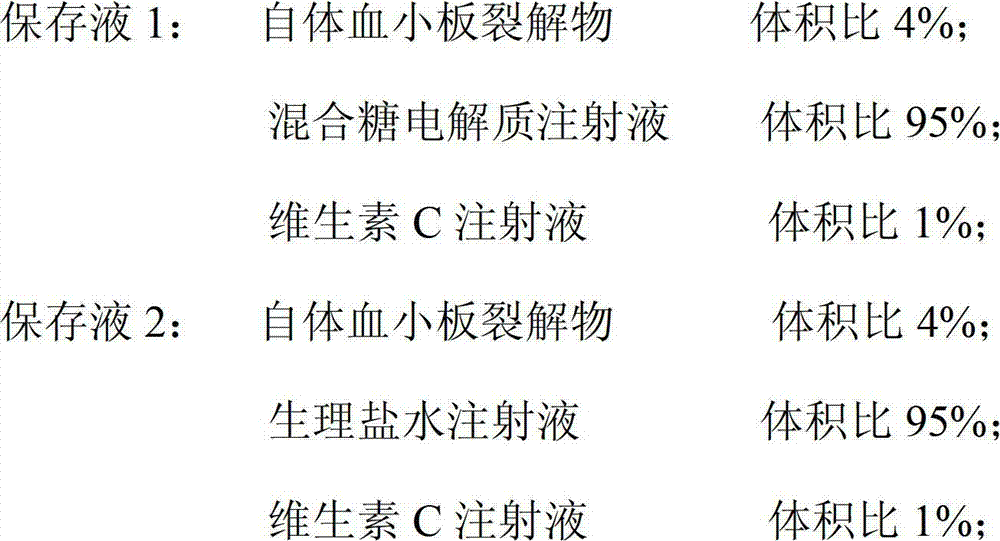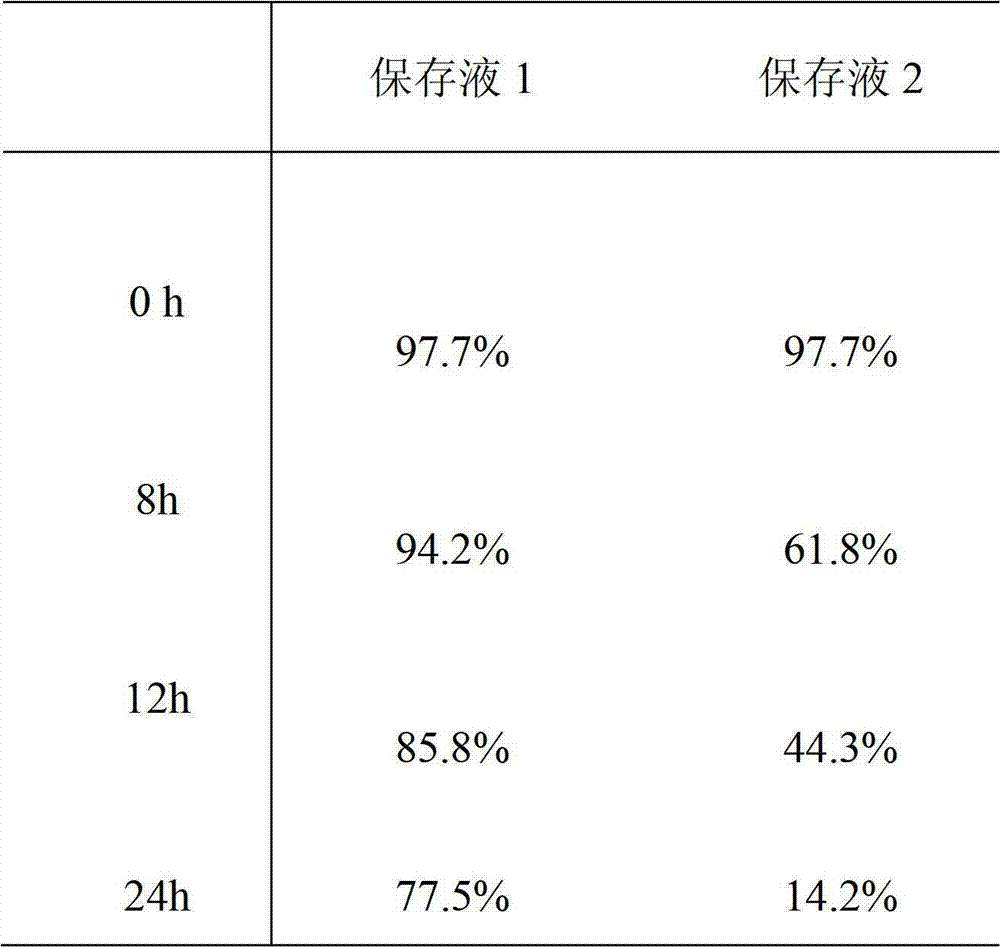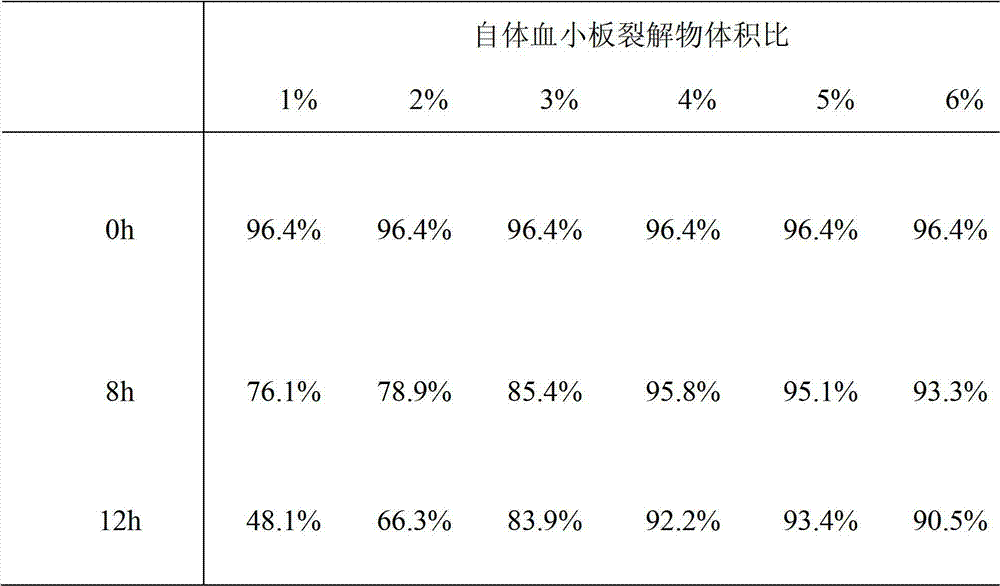Mesenchymal stem cell self-preserving liquid
A stem cell and autologous technology, applied in the field of mesenchymal stem cell autologous preservation solution, can solve the problems of affecting clinical effect, stem cell death, low cell viability, etc., and achieve the effect of long-term transportation preservation
- Summary
- Abstract
- Description
- Claims
- Application Information
AI Technical Summary
Problems solved by technology
Method used
Image
Examples
Embodiment 1
[0028]
[0029] 1.1 Operation steps:
[0030] 1.1.1 Preservation solution 1 was prepared by autologous platelet lysate, mixed sugar-electrolyte injection, and vitamin C according to the above ratio; preservative solution 2 was prepared by autologous platelet lysate, normal saline injection, and vitamin C injection according to the above ratio;
[0031] 1.1.2 Prepare adipose-derived mesenchymal stem cell suspensions with preservation solution 1 and preservation solution 2 respectively, and put them into 2ml cryopreservation tubes, in which the number of adipose-derived mesenchymal stem cells is 3×10 6 / ml; prepare 9 tubes for each, 3 tubes as a group, set up 6 groups and store at 4°C for 8h, 12h, 24h;
[0032] 1.1.3 The cells were counted with the automatic cell counter Countess of Invitrogen Company. The results of each group were averaged as described in Table 1.
[0033] Table 1: Detection results of cell viability of adipose-derived mesenchymal stem cells in preservati...
Embodiment 2
[0037] 2.1 Operation steps:
[0038] 2.1.1 The autologous platelet lysate with a volume ratio of 1%, 2%, 3%, 4%, 5%, and 6%, vitamin C injection with a volume ratio of 1%, and the rest mixed sugar electrolyte injection were prepared preservation solution;
[0039] 2.1.2 Prepare adipose-derived mesenchymal stem cell suspensions with different volume ratios of autologous platelet lysate preservation solutions, put them into 2ml cryopreservation tubes, and the number of adipose-derived mesenchymal stem cells is 3×10 6 / ml; prepare 6 tubes for each, 3 tubes as a group, set up 12 groups and store at 4°C for 8h and 12h respectively;
[0040] 2.1.3 The cells were counted with the automatic cell counter Countess of Invitrogen Company. The results of each group were averaged as described in Table 2.
[0041] Table 2: Detection results of adipose-derived mesenchymal stem cells over time in preservation solutions of autologous platelet lysate at different volume ratios
[0042]
...
Embodiment 3
[0045]
[0046]
[0047] 3.1 Operation steps:
[0048] 3.1.1 Preservation solution 3 was prepared by autologous platelet lysate, mixed sugar electrolyte injection and vitamin C according to the above ratio; preservation solution 4 was prepared by autologous platelet lysate and mixed sugar electrolyte injection according to the above ratio;
[0049] 3.1.2 Prepare adipose-derived mesenchymal stem cell suspensions with preservation solution 3 and preservation solution 4 respectively, and put them into 2ml cryopreservation tubes, in which the number of adipose-derived mesenchymal stem cells is 3×10 6 / ml; prepare 9 tubes for each, 3 tubes as a group, set up 6 groups and store at 4°C for 8h, 12h, 24h;
[0050] 3.1.3 The cells were counted with the automatic cell counter Countess of Invitrogen Company. The average results of each group are shown in Table 3.
[0051] Table 3: Detection results of cell viability of adipose-derived mesenchymal stem cells in preservation solutio...
PUM
 Login to View More
Login to View More Abstract
Description
Claims
Application Information
 Login to View More
Login to View More - R&D
- Intellectual Property
- Life Sciences
- Materials
- Tech Scout
- Unparalleled Data Quality
- Higher Quality Content
- 60% Fewer Hallucinations
Browse by: Latest US Patents, China's latest patents, Technical Efficacy Thesaurus, Application Domain, Technology Topic, Popular Technical Reports.
© 2025 PatSnap. All rights reserved.Legal|Privacy policy|Modern Slavery Act Transparency Statement|Sitemap|About US| Contact US: help@patsnap.com



